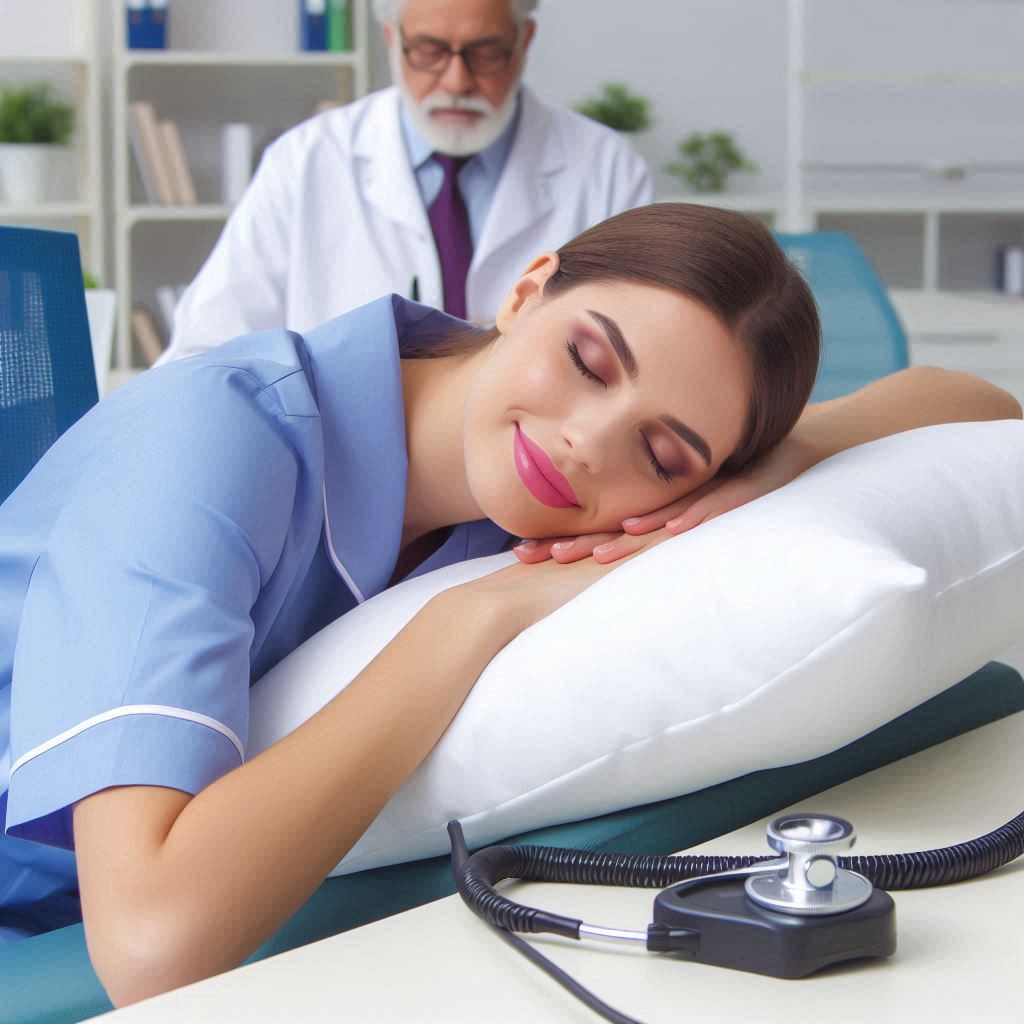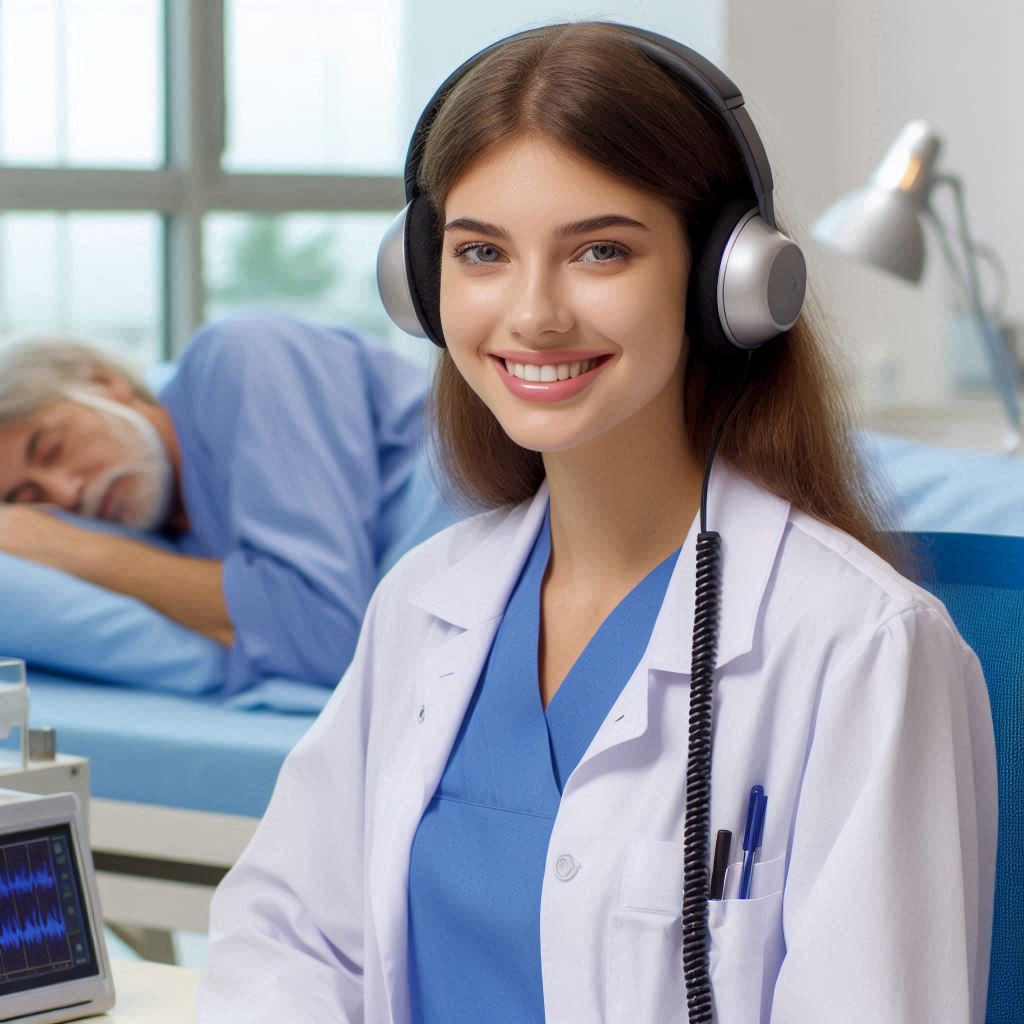Introduction
Within healthcare, Sleep Technologist Lab play a vital role in diagnosing and managing sleep disorders.
These professionals operate within specialized facilities known as sleep labs or polysomnography labs.
What is a Sleep Lab?
A sleep lab is a specialized facility equipped with advanced technology for conducting sleep studies.
These studies involve monitoring patients overnight to assess various physiological parameters during sleep.
The Role of a Sleep Technologist
A sleep technologist’s primary responsibility is to administer and monitor sleep studies.
They use polysomnography equipment to record brain waves, heart rate, and breathing patterns.
Their role includes ensuring patient comfort throughout the study and interpreting data to assist in diagnosing sleep disorders.
This profession requires technical proficiency in operating monitoring equipment and analyzing sleep data.
Sleep technologists collaborate closely with sleep specialists and healthcare teams to provide accurate diagnostic information and contribute to effective treatment plans.
Overview of a Sleep Technologist
A sleep technologist is a healthcare professional who specializes in the diagnosis and treatment of sleep disorders.
They work in sleep labs, conducting sleep studies to assess patients’ sleep patterns and quality.
Qualifications and education required
To become a sleep technologist, individuals typically need an associate degree in polysomnography or a related field.
They also need to pass a certification exam, such as the Registered Polysomnographic Technologist (RPSGT) exam.
Job responsibilities in a sleep lab setting
- Setting up and calibrating sleep study equipment
- Monitoring patients during sleep studies
- Recording and analyzing sleep data
- Assisting with patient education and comfort
- Collaborating with physicians to interpret results
Importance of their role in diagnosing sleep disorders
Sleep technologists play a crucial role in diagnosing sleep disorders by identifying abnormalities in patients’ sleep patterns.
They help physicians make accurate diagnoses and develop effective treatment plans based on the sleep study results.
Read: Career Opportunities for Genetic Counselors
Daily Tasks of a Sleep Technologist
Setting up and Calibrating Equipment for Sleep Studies
A sleep technologist’s day typically begins with setting up and calibrating various equipment used for sleep studies.
This includes preparing electrodes, sensors, and other monitoring devices to ensure accurate readings.
The technologist must carefully follow specific protocols to guarantee that all equipment is functioning correctly before the patient arrives.
This step is crucial in obtaining reliable data throughout the sleep study.
Monitoring Patients during Sleep Studies
Once the equipment is set up, the sleep technologist is responsible for monitoring patients during their sleep studies.
They observe the patient’s sleep patterns and behavior using specialized equipment.
Throughout the night, the technologist pays close attention to the patient’s vital signs, brain activity, eye movements, and muscle tone.
Any abnormalities or disruptions in sleep are noted for further analysis.
Documenting and Analyzing Data Collected during Studies
After the sleep study is complete, the technologist meticulously documents all the data collected during the monitoring process.
This includes recording the patient’s sleep stages, breathing patterns, and any significant events that occurred.
The next step involves analyzing the data to identify any potential sleep disorders or issues.
The technologist must use their expertise to interpret the findings accurately and prepare a detailed report for the sleep physician.
Essentially, the role of a sleep technologist is vital in diagnosing and treating sleep disorders.
Their daily tasks involve setting up equipment, monitoring patients, and analyzing data to provide comprehensive sleep study results.
Read: Licensing and Certification for Genetic Counselors
Collaboration with other Healthcare Professionals
As a sleep technologist, one of the key aspects of your role is to collaborate closely with other healthcare professionals to ensure the best possible care for patients.
Working closely with physicians to interpret study results
One of the primary areas where collaboration is essential is in interpreting study results.
Sleep technologists work closely with physicians to analyze and interpret data collected during sleep studies.
This collaboration is crucial in accurately diagnosing sleep disorders and determining the most appropriate treatment options for patients.
Communicating with patients about their diagnosis and treatment plan
Another important aspect of collaboration is communicating with patients about their diagnosis and treatment plan.
Sleep technologists play a key role in educating patients about their condition, explaining the results of their sleep study, and helping them understand their treatment options.
This communication helps ensure that patients are fully informed and actively involved in their care.
Coordinating care with other healthcare providers to ensure comprehensive treatment for patients
In addition to working closely with physicians and patients, sleep technologists also coordinate care with other healthcare providers to ensure comprehensive treatment for patients.
This may involve collaborating with specialists such as pulmonologists, neurologists, or psychologists to address the various aspects of a patient’s sleep disorder.
By working together as a team, healthcare professionals can provide holistic care that addresses all of the patient’s needs.
Lastly, collaboration with other healthcare professionals is essential for a sleep technologist to provide the best possible care for patients.
By collaborating with physicians, sleep technologists ensure patients get comprehensive treatment for sleep disorders.
They communicate effectively with patients and coordinate care with other providers.
Read: Genetic Counselor vs. Geneticist: Key Differences
Importance of Sleep Technologists in Patient Care
Sleep technologists are trained professionals who specialize in the field of sleep medicine.
They possess the knowledge and skills necessary to conduct various types of sleep studies, interpret results accurately, and collaborate effectively with other healthcare providers.
Their expertise is crucial in identifying sleep disorders that may otherwise go undiagnosed or misdiagnosed, thereby improving overall patient health and quality of life.
Recognizing Signs of Sleep Disorders
One of the primary responsibilities of sleep technologists is to recognize and assess the signs and symptoms of sleep disorders in patients.
These disorders can range from obstructive sleep apnea and insomnia to restless legs syndrome and narcolepsy.
By conducting thorough assessments and reviewing patient histories, sleep technologists can identify patterns indicative of sleep disturbances.
Key signs they look for include:
- Excessive Daytime Sleepiness: Persistent drowsiness or difficulty staying awake during daytime activities.
- Snoring and Breathing Irregularities: Loud snoring, choking, or gasping sounds during sleep, often associated with sleep apnea.
- Insomnia Symptoms: Difficulty falling asleep, staying asleep, or waking up too early and being unable to return to sleep.
- Movement Disorders: Restless legs syndrome, periodic limb movement disorder, or abnormal movements during sleep.
Role in Diagnosing and Treating Sleep Disorders
Sleep technologists play a crucial role in diagnosing sleep disorders through polysomnography (PSG) and other sleep studies.
These diagnostic tests involve monitoring various physiological parameters during sleep, such as brain waves, breathing patterns, heart rate, and muscle activity.
By analyzing these data, technologists can:
- Differentiate Between Disorders: Determine whether a patient’s symptoms align with specific sleep disorders.
- Quantify Severity: Measure the severity of conditions like sleep apnea through metrics such as the Apnea-Hypopnea Index (AHI).
- Monitor Treatment Efficacy: Assess the effectiveness of treatments like Continuous Positive Airway Pressure (CPAP) therapy for sleep apnea.
Their ability to accurately interpret test results and collaborate with sleep physicians is essential for developing personalized treatment plans tailored to each patient’s needs.
Transform Your Career Today
Unlock a personalized career strategy that drives real results. Get tailored advice and a roadmap designed just for you.
Start NowProviding Support and Guidance to Patients
Beyond diagnosis, sleep technologists play a pivotal role in supporting patients throughout their treatment journey.
This involves:
- Patient Education: Explaining sleep study procedures, discussing the importance of sleep hygiene, and providing information about prescribed treatments.
- Comfort and Assurance: Ensuring patients feel comfortable during sleep studies by addressing concerns and providing reassurance.
- Continuous Monitoring: Monitoring patients during sleep studies to ensure safety and data accuracy.
- Follow-up Care: Conducting follow-up appointments to evaluate treatment progress and adjust therapies as needed.
Their empathetic approach and ongoing support help patients navigate the challenges of managing sleep disorders, promoting adherence to treatment plans and overall well-being.
In fact, sleep technologists are indispensable members of the healthcare team, leveraging their expertise to identify, diagnose, and treat sleep disorders effectively.
By recognizing signs of sleep disturbances, conducting diagnostic tests, and providing ongoing support to patients, they contribute significantly to improving sleep quality and overall health outcomes.
Their specialized knowledge and compassionate care make them essential partners in addressing the complex needs of individuals with sleep-related issues.
Read: Benefits of Genetic Counseling for Families

Training and Certification for Sleep Technologists
Overview of certification programs available
Training Programs
Becoming a proficient sleep technologist typically involves completing a formal training program.
These programs are often offered by educational institutions or healthcare facilities and are designed to provide a comprehensive understanding of sleep disorders, diagnostic techniques, equipment operation, and patient care.
Accredited programs are crucial, as they ensure that technologists receive standardized education that meets industry standards.
Programs accredited by bodies like the American Academy of Sleep Medicine (AASM) or the Board of Registered Polysomnographic Technologists (BRPT) are highly regarded.
They cover essential topics such as:
- Sleep Physiology: Understanding the mechanisms and stages of sleep.
- Polysomnography: Learning to conduct and interpret sleep studies using various monitoring devices.
- Patient Care: Developing skills in patient interaction, comfort, and safety during sleep studies.
- Clinical Procedures: Practicing the setup and calibration of sleep monitoring equipment.
Certification
Certification is a pivotal step for sleep technologists to demonstrate their competency and commitment to professional standards. The primary certifications include:
- Registered Polysomnographic Technologist (RPSGT): Offered by the BRPT, this certification signifies mastery in performing and scoring sleep studies.
- Certified Polysomnographic Technician (CPSGT): A secondary level certification by BRPT, suitable for technologists starting their careers or focusing on specific aspects of polysomnography.
- Sleep Health Educator (SHE): Offered by the AASM, focusing on educating patients and the public about sleep health and disorders.
Certification exams typically assess knowledge in sleep disorders, diagnostic procedures, therapeutic interventions, and professional standards.
Passing these exams often requires a combination of education, clinical experience, and ongoing learning.
Ongoing Training Requirements
Maintaining certification isn’t a one-time accomplishment; it requires sleep technologists to engage in continuous learning to stay current with advancements in sleep medicine.
Ongoing training typically involves earning Continuing Education Units (CEUs) or Continuing Education Credits (CECs) through activities such as:
- Conferences and Workshops: Attending industry conferences and specialized workshops to learn about the latest research, technology, and treatment modalities.
- Online Courses: Participating in webinars and online courses that cover emerging topics in sleep medicine.
- Hands-on Training: Gaining practical experience with new equipment or procedures under supervision.
- Journal Articles and Publications: Keeping up-to-date with peer-reviewed literature to understand evolving best practices and clinical guidelines.
These requirements not only ensure that sleep technologists maintain their knowledge and skills but also enhance patient care outcomes by applying the latest evidence-based practices.
Importance of Staying Current with Advancements in Sleep Medicine
Staying abreast of advancements in sleep medicine is critical for several reasons:
- Enhanced Patient Care: New research and technology can lead to improved diagnostic accuracy and treatment efficacy, ultimately benefiting patients with sleep disorders.
- Regulatory Compliance: Many certifying bodies mandate ongoing education to maintain certification, ensuring that technologists meet and exceed minimum competency standards.
- Professional Development: Continuously updating skills and knowledge can open doors to career advancement opportunities within sleep centers, hospitals, or research institutions.
- Interdisciplinary Collaboration: Advancements often involve collaboration with other healthcare professionals, fostering a multidisciplinary approach to patient care.
Staying current helps sleep technologists meet professional obligations and contribute to tackling the rising prevalence and complexity of sleep-related issues in healthcare.
In essence, the journey to becoming a certified sleep technologist involves rigorous training, ongoing education, and a commitment to staying informed about advancements in sleep medicine.
This holistic approach not only ensures high standards of patient care but also supports professional growth and development in this specialized field.
Job Outlook and Career Opportunities
Working as a sleep technologist presents promising career prospects with a growing demand in the healthcare industry.
Healthcare facilities, sleep clinics, and research institutions are actively seeking qualified sleep technologists to meet the increasing need for sleep disorder evaluation and treatment.
With the prevalence of sleep-related issues on the rise, the demand for skilled professionals in sleep medicine continues to escalate.
Demand for Sleep Technologists in the Healthcare Industry
The demand for sleep technologists in the healthcare industry has been on the rise in recent years.
As awareness about the importance of sleep and its impact on overall health grows, more individuals are seeking evaluation and treatment for sleep disorders.
Healthcare providers are recognizing the significance of diagnosing and managing sleep-related conditions, leading to an increased need for qualified sleep technologists.
Potential for Career Advancement in Sleep Medicine
Working as a sleep technologist offers ample opportunities for career advancement in the field of sleep medicine.
Professionals can pursue further education and training to specialize in specific areas of sleep disorders, such as pediatric sleep medicine or insomnia treatment.
Advanced certifications and credentials can also open doors to leadership roles, research positions, or teaching opportunities within the sleep medicine field.
Opportunities for Specialization in Specific Sleep Disorders or Treatments
Sleep technologists have the option to specialize in specific sleep disorders or treatments to enhance their skills and expertise.
Certifications in areas like polysomnography, CPAP therapy, or circadian rhythm disorders can provide a competitive edge in the job market.
Specializing in a particular niche within sleep medicine can lead to greater job satisfaction, higher earning potential, and increased demand for specialized services.
Conclusion
Sleep technologists play a crucial role in diagnosing and treating sleep disorders.
They are responsible for monitoring patients overnight and collecting data that helps physicians make accurate diagnoses.
Sleep technologists also provide support and education to patients, helping them understand their condition and treatment options.
Recap of the role and importance of sleep technologists in diagnosing and treating sleep disorders
In closing, sleep technologists are essential members of the healthcare team, contributing to better patient outcomes and quality of life.
Their expertise in sleep medicine helps identify underlying issues and recommend appropriate interventions for patients with sleep disorders.
Encouragement for those interested in pursuing a career in sleep medicine
If you have a passion for helping others improve their sleep quality and overall health, consider a career in sleep technology.
There is a growing demand for skilled sleep technologists, making it a rewarding and promising field to explore.
Transform Your Career Today
Unlock a personalized career strategy that drives real results. Get tailored advice and a roadmap designed just for you.
Start NowCall to action to learn more about the field of sleep technology and its impact on patient care
Take the first step towards learning more about sleep technology by researching accredited programs and certifications in this field.
By expanding your knowledge and skills in sleep medicine, you can make a difference in the lives of patients struggling with sleep disorders.




